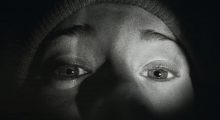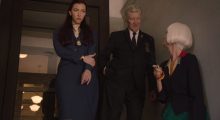Authors — Nicholas Rombes
-
From Shadows: What It Means to Love David Lynch

With David Lynch’s passing comes a reminder that, in the words of Thomas Aquinas, the “things that we love tell us what we are.” How simple, how direct, how naturally right this sounds on its face—yet scratch the surface and, whoa, you may find a huddle of rapacious black beetles tearing the hell out of each other. Explain that as a “thing that you love” to your grandmother—which I did, or tried to, during the summer break of my junior year at college, and would have had she not said almost to herself, during the Frank-ritualistically-raping-Dorothy scene, “I don’t know […]
by Nicholas Rombes on Mar 18, 2025 -
Seducing the Future

To say that the transformations that film and film technology have undergone since Filmmaker’s inaugural year — 1992 — are revolutionary is an understatement. DVD was still on the horizon, DV camcorders were several years away and the notion of shooting and editing a full-length motion picture with no actual film seemed downright futuristic. There have been book-lengths’ worth of changes since that first issue, but here are just a few. I. Metadata The information surrounding a film has stretched far beyond mere publicity (the classical era) and merchandising (post-1977 Star Wars), becoming enmeshed within the very fabric of a […]
by Nicholas Rombes on Sep 14, 2017 -
Twin Peaks: A Language More Powerful Than Words

Of all the remarkable aspects of Twin Peaks: The Return, perhaps the strangest is not something that is present, but something that’s absent: the utter lack of any recognizable psychology. Characters simply aren’t motivated by the familiar psychological archetypes and cliches that underpin almost all narrative entertainment, especially series-based television. It’s not so much that the plot is inscrutable or resistant to interpretation, but that characters react to what’s happening around them in ways that look and feel familiar, but which betray little if anything of what’s going on in their heads. As opposed to shows like House of Cards […]
by Nicholas Rombes on Jul 10, 2017 -
Reactionary Wokeness

Near the beginning of Peter Watkins’s still-astounding 1971 fictional dystopian documentary Punishment Park, one of the African-American defendants, Lee Robert Brown, is hauled in handcuffs before a makeshift, extra-legal tribunal in the sweltering California desert, where he is instructed to defend his counter-cultural militancy. He says, in part: “You talk as if this is some great, civilized, nonviolent place. It ain’t. America is as psychotic as it is powerful and violence is the only goddamned thing that will command your attention.” These lines floated to the top of my head while sitting though James Mangold’s Logan, widely praised for its […]
by Nicholas Rombes on Jun 16, 2017 -
Incoherent Cinema

In his 1986 book Hollywood from Vietnam to Reagan, film theorist Robin Wood explored, in a chapter entitled “The Incoherent Text: Narrative in the ’70s,” just how and why so many seminal films of that era were — ideologically — incoherent, unable to maintain a sustained and coherent vision of their protagonists as well as their fictive worlds. Wood did not mean incoherent in a pejorative sense; he wasn’t referring to movies that “failed” or that were poorly made. And he wasn’t talking about films that were deliberately chaotic or incoherent, but rather films that subconsciously reflected and distorted larger […]
by Nicholas Rombes on Apr 13, 2017 -
Trumpian Images

“Baby, there’s no storm outside.” —from Take Shelter In his now classic book From Caligari to Hitler: A Psychological History of the German Film, Siegfried Kracauer looked for cinematic hints, clues and warnings about the rise of Naziism and Hitler in pre-War Germany. Published by Princeton University Press in 1947 — just two years after the end of the war — his book was among the first to interrogate the deep architecture of film as a psychological state, one that does not directly mirror but rather reflects in a distorted way the “secret history” of mass psychology that, in his […]
by Nicholas Rombes on Jan 18, 2017 -
“This is a Show about Dread”: Nick Antosca on the SyFy Series, Channel Zero

Although the Netflix series Stranger Things has received more mainstream attention, the Syfy series Channel Zero is arguably more unsettling and less predictable, and executed with a more determined vision. With six episodes this season (“Candle Cove”) and six in production for 2017 (“The No-End House”), the series has more in common with the French horror series Beyond the Walls (Shudder) in terms of its willingness to allow for slowness and its non-clichéd approach to characters. Both shows suggest the increasing prominence of, for lack of a better term, “weird fiction” — stories that treat horror as a kind of […]
by Nicholas Rombes on Nov 4, 2016 -
Against the Reality Industrial Complex

In August 2016 Bret Easton Ellis posted this on Twitter: It happened: HBO’s brilliant The Night Of effectively eradicates the notion of the two-hour American theatrical movie. By now this is a familiar refrain: that in the era of long-form television, the quaint notion of trying to tell a complex story in just a couple of hours is all but dead. It’s hard to write a “defense” of movies without coming across as reactionary, nostalgic, elitist, purposefully difficult or just cranky. (Under certain conditions, none of these are bad attributes.) So this isn’t so much a defense of movies as it […]
by Nicholas Rombes on Oct 20, 2016 -
Into the Cut: Is Terrence Malick’s Knight of Cups the Perfect Movie for our Instagram Era?

We are approaching the 50th anniversary of the publication of Marshall McLuhan’s The Medium Is the Massage (was it a printing error, or a pun?), the book that put the phrase on the map, and whose ideas McLuhan had first advanced in his 1964 book Understanding Media. There he argued that “the personal and social consequences of any medium — that is, of any extension of ourselves — result from the new scale that is introduced into our affairs by each extension of ourselves, or by any new technology.” And, later: “Nobody is interested in TV until there are TV […]
by Nicholas Rombes on Apr 21, 2016 -
Six Filmmaking Takeaways from a Novelist-turned-Director

The path that finally led to the making of The Removals — a feature-length paranoid lo-fi thriller and love story produced by Two Dollar Radio — was a very, very long and twisty one. As it probably is for many films. I spent five weeks in the summer of 2015 with an amazing crew and actors making a film that I had been dreaming about and plotting out in fits and starts since I was about 20-years old. And I’m 50 now. I basically had to unlearn everything I thought I knew about the creative process. Here are a few […]
by Nicholas Rombes on Feb 10, 2016
